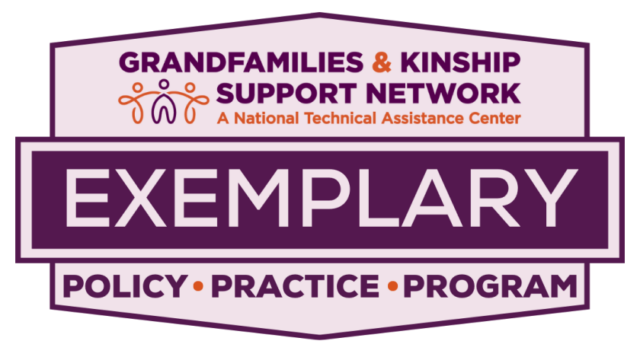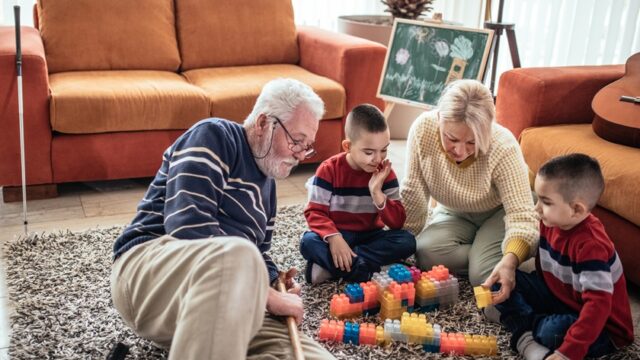Exemplary Programs
Project GRANDD (Grandparents Raising And Nurturing Dependents with Disabilities)
Download This Resource
Innovative Solutions for Disadvantage & Disabilities – Atlanta, Georgia
In 2005, Project GRANDD (Grandparents Raising And Nurturing Dependents with Disabilities) at Innovative Solutions for Disadvantage & Disabilities (ISDD) began serving eight grandparents raising children with disabilities. Since that time, Project GRANDD’s staff and budget have grown to serve over 400 children and caregivers throughout the Atlanta metropolitan area each year. The Grandfamilies & Kinship Support Network is pleased to designate Project GRANDD as exemplary. Like all exemplary kinship programs, Project GRANDD collaborates with an array of partners to maximize its reach and support of kinship families and is continuously improving by listening to their caregiver clients.
Project GRANDD’s core components use the evidence-based Kinship Supports Intervention model. Core components of Project GRANDD that Network staff and partners explored through our site visit include:
- Case management with wrap-around services.
- Support groups for adults, children, and teens.
- Material assistance.
- Annual summer family fun and Christmas adopt-a-family events.
Eligibility for Services and Intake
The program serves any kin caregiver raising a child with disabilities in the Atlanta metropolitan area. A disability does not have to be diagnosed by a health care provider and can include behavioral issues that can make caregiving challenging. There are no age or income requirements for the caregivers. The program director does the intake process with each caregiver, asking them questions about their needs and strengths. As of March 2024, about 40 caregivers are on a waitlist for case management services, but there is no waitlist to join the support groups and parenting/ caregiving classes.
Service Population
Project GRANDD serves approximately 400 kin caregivers and children each year. Over 90 percent of the caregivers are African American, and most of them are single grandmothers. Although Project GRANDD serves caregivers of any age and income level, the majority are age 55 and over and have incomes of less than $30,000 per year.
Services
Case Management with Wrap-Around Services
After intake, a caregiver is assigned a case manager to help develop and support a case plan based on the needs identified during the intake process. Case mangers work with the caregivers to help connect them and the children they raise to services and support. Available services and supports include in-house help with children’s individual education programs (IEPs), respite and tutoring through contracted providers, assistance working with the state’s kinship navigator to help the caregiver access public benefits, and referrals to Atlanta Legal Aid, Inc. for any needed legal assistance for caregivers who meet Legal Aid’s income guidelines. For those whose income is not at or below 200 percent of the federal poverty level, Project GRANDD has funding to help pay for legal assistance to obtain court-ordered guardianship.
Well, I get help whenever I need it and when I call them and ask them, they really work hard on finding out what avenue I need to go down to get the assistance.
New grandparent caregiver client
Support Groups for Adults, Children, and Teens
As of March 2024, Project GRANDD is offering five support groups a month; four are in-person at locations around the area – typically public libraries – and one is virtual. The evening in-person groups provide dinner, and the adults stay together for support and/or a presentation. Project GRANDD gives respite to caregivers during the meetings by providing the littlest children with childcare and offering separate support groups for children ages 8 to 12 and for teenagers.
Project GRANDD began offering virtual support groups during the COVID-19 pandemic. At first, offering virtual groups was challenging because of limited technology literacy among caregivers. In response, the case managers went into caregivers’ homes and provided basic
technology education, and in some cases the agency provided laptops. That assistance opened up a new, supportive community for many kinship families who were completely isolated due to the pandemic and caregiving, including one grandmother providing full-time caregiving for a severely disabled child.
The other thing, I love it, they had also had a children’s support group that was online. So, my grandson really enjoyed doing that. It’s just peers his age. They would actually have a full meeting online. Now we have the meetings where the kids will break out the teens or the younger kids.
Grandparent caregiver client
Material Assistance
During the pandemic, federal CARES Act and ARPA relief funding allowed Project GRANDD to help grandfamilies pay for food and make utility and rent payments. While that funding is no longer available, ISDD has been able to find additional sources of support to continue providing families with funding for food, rent and utility payments, and other family needs. In addition, throughout the agency’s history, ISDD’s donors have generously supported school supply drives and adopt-a-family efforts at Christmas.

Photos Courtesy of Project GRANDD

I don’t ever have to buy anything out of my pocket for Christmas. Never. Never.
Long-term grandparent caregiver client
Family Events
Project GRANDD organizes at least one family outing a year. The events have included trips to the zoo, a trampoline park, bowling, an art museum, and even an arcade. The outings have included transportation and meals, and caregivers report really looking forward to them.



Staff
As individuals with lived experience in kinship families and raising children with disabilities, the staff relate to the families they serve. A committed staff of seven – consisting of the executive director, the program director, the program manager, and four case managers – runs Project GRANDD. The program continues to grow and, as of March 2024, they were advertising to hire a fifth case manager to address the program’s waitlist.
It’s a great program. They’ve helped a lot of people. They’ve helped myself and a lot of other people and they’re all good listeners.
Kin caregiver client
Key Partners
The Georgia Division of Aging manages a statewide kinship care workgroup and a kinship program coordinators’ group that meets quarterly to share resources and coordinate work on behalf of kinship families in the state. Project GRANDD staff and other kinship service providers are part of these groups and collaborate to support kinship families across the state.
Among Project GRANDD’s other key partners are:
- Atlanta-Fulton County Library System – provides support group meeting space at no charge.
- Atlanta Legal Aid Society, Inc. – provides legal issues training for Project GRANDD staff and free legal assistance and training to Project GRANDD caregiver clients.
- Atlanta Regional Commission – provides financial support and referrals, along with a networking forum with other aging service providers and community connections.
- DeKalb County Board of Commissioners under the guidance of the Department of Human Services – provides funding and technical assistance.
- Fulton County Board of Commissioners under the guidance of the Department of Community Development – provides funding and technical assistance.
- In-Home Tutors Atlanta – provides in-home tutors to assist children who are not performing at grade level.
- Kinship Navigator Program at Georgia Division of Family & Children Services – helps caregivers obtain public benefits, including TANF (Temporary Assistance for Needy Families), Medicaid, and SNAP (Supplemental Nutrition Assistance Program), and provides referrals to Project GRANDD.
- Marcus Autism Center – has a reciprocal referral relationship with Project GRANDD and provides diagnosis and treatment to children with autism in Project GRANDD.
- Parent Resource Center of Georgia – assists with advocating to meet the children’s special education needs.
- Project Healthy Grandparents – makes referrals to Project GRANDD and accepts referrals to its 12-month intensive program.
- United Way of Greater Atlanta – provides funding and support to Project GRANDD.
- Your Respite – provides respite to caregivers in Project GRANDD through specialized childcare for children with disabilities.
Rainie [Jueschke, ISDD’s Executive Director] has been really innovative, mindful, and intentional about connecting to other organizations or frameworks or whatever the case may be…I love that about her because she’s willing to push the envelope.
Project GRANND funder and partner
Caregiver Engagement
Project GRANDD is informed by kin caregiver involvement, including an ISDD board member who is a kin caregiver. Caregiver clients frequently provide input into Project GRANDD’s offerings. Twice a year, ISDD sends the families a Kinship Program Participant Survey, which asks about the quality and impact of Project GRANDD’s services and the availability of all community services needed by kinship families. Once a year, case management clients are also surveyed about their experiences with that service. After each support group meeting and family outing, participants receive a brief survey requesting feedback and suggestions for future programming. In addition, every three or four years, ISDD conducts focus groups and one-on-one interviews with caregiver clients and other constituents for a deeper discussion on Project GRANDD’s performance and how to improve.
We try to provide our clients what they tell us they need, not what we think they need.
Project staff member
Outreach to the Families
Project GRANDD staff members regularly work with school counselors, and families are referred to the program by them. Project GRANDD staff members also often set up tables at church and other community fairs to reach families. Other referrals come from Atlanta Legal Aid, a local autism center, Project Healthy Grandfamilies, and Georgia’s kinship navigator program, among others.
Funding and Sustainability
ISDD’s executive director is a CFRE (Certified Fund Raising Executive). She attributes much of her fundraising success to the skills she acquired through this process, which includes mandatory continuing education to maintain and renew the certification.
Thanks to the executive director’s fundraising efforts, Project GRANDD has a diverse funding base. They receive a variety of government funding – including from Georgia’s child welfare and aging departments – and ongoing funding from United Way of Greater Atlanta. Individual donors are also important.
During the pandemic, federal funds from the CARES Act and ARPA helped Project GRANDD support caregivers with many material needs, including laptops, and funds to pay for groceries, rent, utilities, and other needs. Although that funding is no longer available, ISDD is continuously looking for funding to help with concrete needs, including affordable housing.
Demonstrating Success and Continuing Quality Improvement
Project GRANDD uses standards developed by the Family Support Network as the basis for its ongoing quality improvement process. The Standards of Quality for Family Strengthening & Support has five sections, one of which is family centeredness. Project GRANDD centers all their work around input from kin caregivers. Caregiver clients regularly report that Project GRANDD’s services help them to feel less stressed and better able to cope with and continue caregiving.

Project GRANDD’s service delivery methodology is based upon the evidence-based model Kinship Supports Intervention (KSI). According to both the California Evidence-Based Clearinghouse for Child Welfare and the federal Title IV-E Prevention Services Clearinghouse, there is “promising” scientific support for the effectiveness of KSI.
ISDD uses Bonterra’s Apricot as a data management tool and has recently upgraded their subscription to include additional outcome management tools to better monitor their success and make program improvements.
Challenges and Areas for Program Improvement and Growth
Project GRANND staff, partners, and caregivers all raised the need for more funding to address housing needs and to hire another case manager to serve the families on their waitlist.
Lesson Learned
Project GRANND staff members emphasize the need to listen to caregivers and to continue to try to improve each year and always get “a little bit better.”
Additional Program Resources
Learn More about the Network’s Exemplary Designation
Network staff, along with two staff of a partner organization, participated in a site visit to this program and are available to answer questions based on this summary. Please complete this short form and we will get back to you.
For information about the steps and criteria of the exemplary designation process, please click here.
